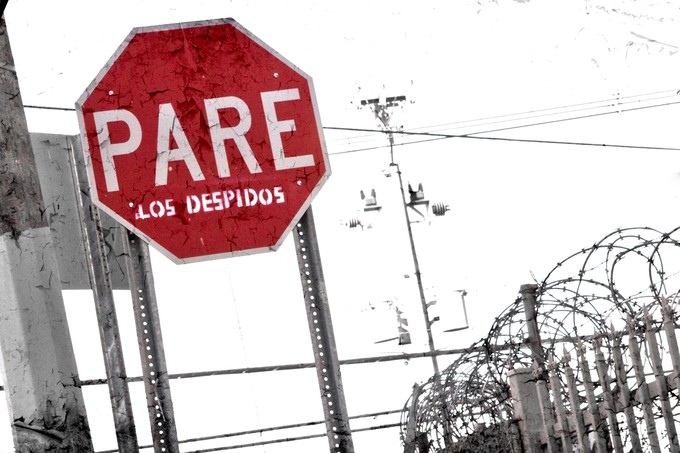Minimum Wage at $4.25 per hour?! This is not the help Puerto Rico needs.
By
Guest Blogger
Posted:
|
Social Insurance, Earned Benefits, & Safety Net
by Gigi Litovich

Photo courtesy of ep_jhu. “Stop the lay-offs” in reference to tens of thousands of fired government employees around 2009.
Imagine having to live on $4.25 per hour with even higher living expenses. Sounds impossible, doesn’t it? This could be the reality in Puerto Rico for thousands of young people under 25 if the bill HR 4900, known as the Puerto Rico Oversight, Management, and Economic Security Act (PROMESA), passes. This Act could force U.S. citizens, many who are already struggling with student loan bills and families into even worse poverty.
Puerto Rico is in a severe economic crisis, but this bill is not the solution. If enacted, PROMESA would establish a President-appointed financial control board with powers that surpass all the democratically elected officials in Puerto Rico. What? Congress, we need help, not to be further impoverished and treated like second-class citizens.
By the way, Congress, weren’t you involved in the making of this crisis?
U.S. Policies that Affected Puerto Rico Economy
-
Operation Bootstrap is a policy from the 1940’s in which the federal government, in conjunction with what is now the Puerto Rico Industrial Development Company, changed the economy in Puerto Rico from agriculture to industry through Import Substitution Industrialization (I.S.I.). This particular way of industrialization has been heavily criticized because it promotes a bigger gap in income inequality, and makes countries more dependent on others and unable to compete in the global economy.
-
The Jones Act requires Puerto Rico to limit all of its imports to those that arrive on ships that are built, owned, registered, and crewed by mainland Americans.This destroys any chance of international competition for Puerto Rican imports and, added to the fact that Puerto Rico can no longer participate in the mass production of agriculture, the result is heavily taxed and expensive food, energy, transportation, water production, and electricity. This makes it almost impossible to live without government subsidies and to promote business.
-
Section 936 of the IRS Code created tax incentives to attract U.S. companies to Puerto Rico in the 70’s. However, after a couple of decades, the Clinton administration decided to phase out this policy. Over the span of 10 years, Puerto Rico’s leading industries left the island leaving many out of work-- either directly or indirectly because of this decision. Right after this policy was fully phased out in 2006, Puerto Rico entered a deep recession that exacerbated the island’s irresponsible borrowing. This also led to migration off the island.
Yes, Puerto Rico’s irresponsible borrowing and governmental inefficiency is the easiest to point to when asking why the debt is so great. Things like crime, corruption, the poverty cycle, the “brain drain”, and high living cost have also contributed to the creation of this humanitarian crisis.
Yet, it seems to me extremely unfair that the people who are going to suffer for these mistakes are the ones who can’t afford to, and the ones that didn’t even have the opportunity to choose these bad policies. When Puerto Ricans on the island can’t vote in U.S. elections that shape P.R.’s policies, politics, interactions with other countries, economy, way of life, culture, and future, how is it that a big part the solution to this problem is to appoint a financial control board that surpasses all political power on the island? How it is that the young and poor, those with little to no political power, are the ones that will suffer most? Ultimately, the result of this policy will be even more migration of young workers, and will worsen the situation on the island.
Helpful Links:
http://blogs.wsj.com/economics/2015/07/01/is-puerto-rico-another-greece-10-questions/
Links in Spanish:
http://www.univision.com/noticias/salario/no-se-puede-vivir-con-425-la-hora-en-puerto-rico-video
http://www.primerahora.com/noticias/puerto-rico/nota/nodaelsalariominimo-1149955/
Gigi Litovich is working with NPP as a research and development student intern. She is a rising senior at Smith College, majoring in Government and minoring in Public Policy. Born and raised in Puerto Rico, Gigi is interested in Latin American and Caribbean studies, social justice, and intersectional feminism. This post is the first in a series about Puerto Rico. The viewpoints contained do not necessarily reflect the positions of the organization.